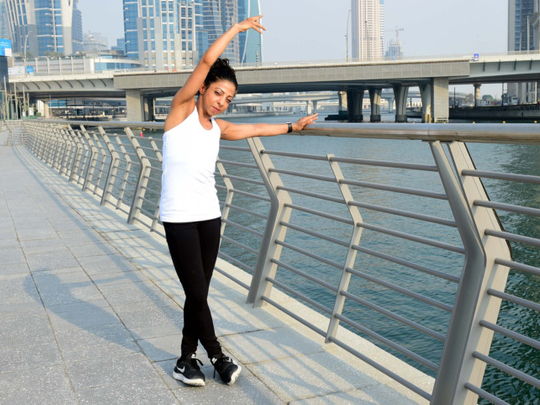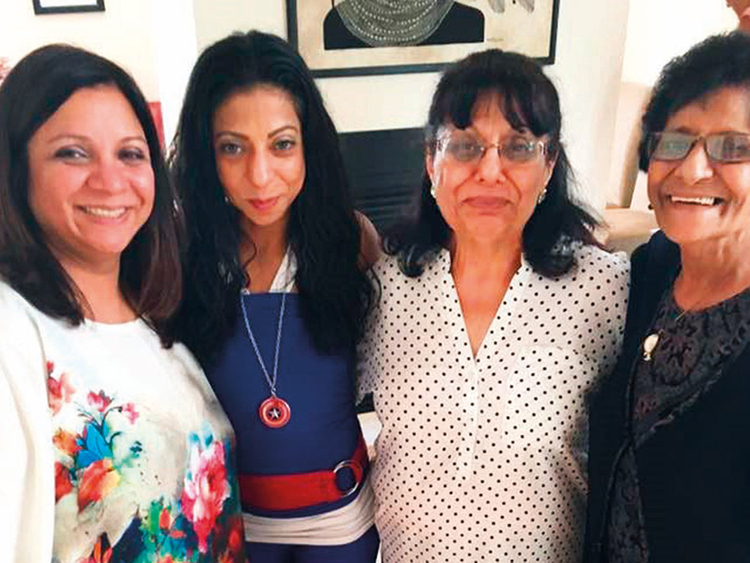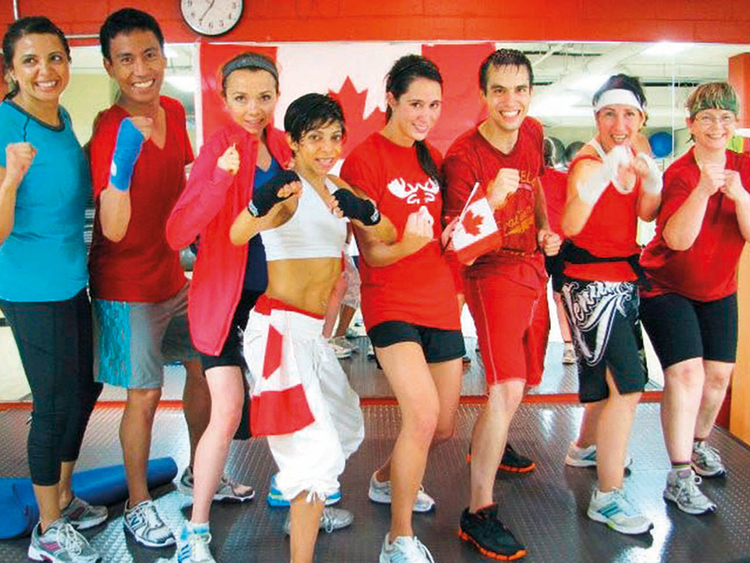
Nauzath Nathoo’s story has all the elements of a movie — pain, hope, endurance and the power of the individual. And her lesson? No matter what life throws at you, we all have the power within to overcome.
“Focus on your internal influence, on what you can control — and leave the rest to fate, says Nathoo — or Noni as she calls herself. “You will come out stronger.”
As a teenager, Noni was in excellent shape physically and was thriving academically. Then suddenly, it all changed when she was diagnosed with a rare kind of acute arthritis. Now, the 37-year- Canadian from Tanzania, looks back on the frustrations of suddenly being bedridden during her teenage years. Somehow, she had to take back control of her life, overcome the pain and emotional angst, and get on with it.
And that’s what she has done.
Today Noni, who just recently moved to Dubai, is a personal trainer and an instructor in body combat and self-defence classes — and now looks back on her difficult and painful years as a source of inner strength.
“Everything I have been through helped shaped me into the person I am,” she tells Weekend Review.
The beginning of her medical troubles began when she had almost turned 16 and was diagnosed with juvenile-onset arthritis or juvenile trauma arthritis. She spent weeks in hospital and, when she was released, she needed the help of others to simply move around her home or at school. Then she began to realise how her brain and its way of thinking could cope up with this new reality, and hopefully overcome her new-found difficulties.
Born in Tanzania to Tanzanian parents and ancestors of Middle Eastern and Indian-origin, Noni and her elder brother and sister were raised to highly regard education as an “important tool”.
“I remember how I always wanted to go to university, though I don’t know what that was,” Noni recalls. “I remember talking when I was 6 years old that ‘I want to go to university’ and people would ask, ‘do you know what that means?’ I would say ‘no, but this is where I am going.’ That is just how we were raised.”
“We were raised to regard education as something very important,” she says. “This has helped me through all the phases of my life. Education and feeding my brain with answers have helped me a lot.”
Today, she still recalls how her mum and dad said she used to ask a lot of questions. “My dad was entertained by my inquisitiveness,” she says. “One of things my brother and I used to do as we were growing up was compete against each other reading my dad’s encyclopedia collection. That was our big competition. We were competing to see who would get [to read] as many volumes as possible.”
With a goal of offering their children the best education, the family migrated to Canada.
“One of the reasons for moving was my parents wanted us to think further and think university, because they both had ambitions to do professional things, but they didn’t,” she says. “They ended up falling into their family business.”
Her father was a car mechanic and her mother owned an auto part shop.
Noni was bright enough, especially in mathematics and sciences, that she was bumped to two grades when she moved to Canada at the age of 12. She was placed in grade 9 immediately. Though it seemed a promising transfer, the move put pressure on the little girl, who was also a little spoilt being the youngest in the family.
She was the youngest in her class, living in a new city, new surroundings, and a new way of life
“It was a very big cultural shock,” she recalls. “I had been through some very tough years trying to adjust. It was so rough that I wanted to go home to Tanzania many, many different times. It was a difficult social environment for me.”
It took two years, but Noni gradually adapted to her new life, and it came through by finding strength in her academic work and the sporting opportunities that were on offer in her new country. She joined the soccer team, a touch football squad and a hip-hop dancing team in her school, all of which helped her fit in socially and make new friends.
But not everything was rosy.
Two years after the family moved to Canada, her father travelled back to Tanzania to wrap up the family business. He stayed there for two years, and never returned to Canada. Two months before his expected return, in May 1996, he died. His sudden death came as a complete shock to the family, more so because he hadn’t been ill and died from a sudden brain aneurysm. The family travelled to Tanzania to bury him.
“When we returned to Canada, the way I coped was by immersing myself further into studying and sports,” she says. “I know my dad was extremely proud of me for what I was doing, so I just decided just to do more. Unfortunately, I was training a little bit too hard.”
One day, Noni returned home feeling unwell after a soccer game. She had a fever and felt fatigued. Her mother’s sage advice was to get a good night’s sleep and see how the daughter would feel the next day.
“In the morning, my brother and sister left for school and my mum went to work, and basically, I woke up and I couldn’t move,” she says. “I was completely paralysed, and I could not move. I just couldn’t move.”
She used whatever energy she could gather to reach the phone and call help. An ambulance took her to hospital and her mother rushed there from work. Noni spent several weeks at hospital undergoing a battery of tests and medications but none managed to explain why her body had seized up.
Running out of options, one of the medical staff suggested tests for arthritis.
The result came back positive. “The diagnosis was that I have a very rare form of arthritis. At the time, they diagnosed it as juvenile-onset trauma arthritis.”
It’s a rare form of the disease with only several thousand cases worldwide. What the doctors knew is that it usually appears in children when they go through puberty.
“Some children do not live through it,” Noni says. “I was lucky in a way because I was extremely active, so that has always helped. What was helpful too is that I hit puberty very late in my life. So, I circumvented those danger years. I managed to survive it when I couldn’t otherwise.”
While doctors think arthritis could be hereditary, they could not say for sure if Noni’s case was, and they could not specify if she was born with arthritis or she developed it later. But what the family knows for sure is she was always sick as a child and her immune system seemed weak.
For several months, doctors unsuccessfully trying several medications. Then one day, Noni started moving her hands.
Throughout her medical treatment, Noni continued her schooling, helped by some friends while at home, her two grandmothers were taking care of her.
“That was horrific,” she says. “Going from someone who is being active to someone who is being helped by people.” But it was also a learning experience that shaped Noni’s personality.
“When I was good at what I used to do among my peers, I became arrogant. My two grandmothers took care of me at home, helping me walk around and things like that. It was brutal to see my grandma go up the stairs and I could not. It was a very humbling experience, and I can tell you if I have not gone through this experience, I would be a very different person today. I think it made me a much kinder, much humbler, much more understanding, and much stronger.
“I became happier person to realise that every gift that is given is actually a gift, and it might not be there tomorrow”.
In essences, Noni became way more positive.
She had issues with her joints, her blood levels and her digestive system. But with every knock she suffered, she would ask herself: “Now what? Why this is happening to me?”
“I needed to understand it and there was not enough information given to me by doctors,” she says.
Noni asked her siblings to find information in the library. “The one thing that I could realise about myself was that when everything was broken down, my brain was still working. And if I still have my brain working, at least I could use that, and feed it with as much information.”
She read everything she could get her hands on, including works by Isaac Asimov, an American writer and professor of biochemistry at Boston University, on the power of the mind.
“That is something I ate up — you know my brain is still working, and if I can think my way out of this, if I can create an environment in my head that would allow me to beat this thing, then maybe I can think my way out of it,” Noni says. “While I was doing that, I was still under medical treatment.”
She wanted to receive not only allopathy, but also alternative medicine, including seeing a naturopath. In the late 1990s, naturopathy, was considered an obscure profession, but Noni felt comfortable with her naturopath, who was knowledgeable and tried to explain to her different things that were happening to her.
“Something I learned from her is that if I understood something, I could get past it,” she says. “I continued at school, and I graduated from high school at the top of my class when I turned 18.”
Noni went to Queens University with a scholarship to studied biochemistry and chemical engineering.
Once again there was a serious setback when she was hit by a car during her second year and needed surgeries to fix a broken jaw and leg. She persevered with her positive attitude and, in 2002, graduated from university. She wanted to continue her studies, but the doctors’ advice was to wait, take a rest and let her health recover.
Noni worked for various government departments for nearly six years, and by the autumn of 2008 she thought of going back to school.
That time, she felt “depressed” because she was supposed to accomplish something, but her wish had not materialised.
“I was kind of lost,” she recalls. “One of the things that I discovered is that I stopped being active. I was doing some dancing, some soccer, but I stopped being active.”
During her university years, she had hit the gym and discovered an interest in human kinetics.
She went to a fitness company in Canada, and saw people attending many classes. She was influenced by the way one instructor looked and how she seems much younger than her real age.
“I read somewhere this question: if you find that secret that keeps you alive forever, would you keep it to yourself or share it with people? The answer to me is instinctual. I would yell it off rooftops. If I found something that could help you live forever, or live well forever, I would be holding a microphone, yelling it to people, saying I found it, do this.”
After many months of training at the gym, she was offered the opportunity to become a body combat instructor. She was unsure. Medical tests showed she suffered from low-bone density that threatened her ability to walk. But she wasn’t deterred.
Going through another cycle of medical treatment at the age of 28 was not an easy idea to digest for Noni. Yet, she decided to try to become an instructor.
“I did not want to tell my family that first because I knew they would get scared,” she says. “I used to go to the body combat classes wearing full tracksuits and bandages over my entire arms and my joints so if I am punching too hard, I won’t hurt myself.”
She still remembers how people thought that was strange because she was sweating too much because she was wearing so many layers.
“When I was told I can teach those classes, for the first training weekends I didn’t bandage myself and did two full days, and I felt stronger.”
She fell in love again with sports and started teaching
Noni also went back to Ottawa University and took several courses in rehabilitation and physical movement.
“I was trying to figure out what is good for me,” she said. “I cannot predict what will happen in the future, all what I know is that I have this disease. My choice is to sit and wait to see what happens, or be proactive, learn as much as I can, and not necessarily control but manage whatever I possibly can to make sure that in the years to come, I am strong.”
Lady Luck started smiling on Noni.
After body combat, she started teaching body attack, and later TRX, and became among the first 50 coaches trained for TRX in Canada. The more she exercised, the better she felt, and the more bones density she built. Eventually, she became a personal trainer.
“The basic quota for a personal trainer was to have 12 clients in three months, and I had 12 clients in five weeks, and ever since then I have not looked back,” she says.
As she was studying at university, she met the man whom she fell in love with and later became her husband. They met at a group to help young people arriving to Canada to adapt socially. The young Kenyan man was among them. Many years later he proposed in such a “sweet way” that was full of imagination, romance and fitness.
It was on New Year’s Eve of 2016, when usually the gym would hold a 3-hour body jam party. The husband-to-be said he would show up at the party, but not for dancing. She thought he would like to come for support.
“Fifteen minutes before the end of the party, his brother came rushing to the studio, as I was just finished teaching. He said there is something going wrong in the other spinning studio,” she laughs. “I went to the studio and there was a slide show of our pictures going on, with music. My brother-in-law was taking pictures, and my husband was dressed up and I was standing sweating from dancing.” He proposed and she said “yes”.
They were married in August 2016 with a relatively small wedding party. The next morning after the wedding barbecue, she went to teach a body combat class. “This was one of the most emotional, amazing classes ever,” she says. “There were almost 80 people who showed up to celebrate my wedding, and be in my body combat wedding class.”
Shortly afterwards, her husband’s company offered him a job in Dubai, and the couple moved last March. After finalising her papers, she started to offer classes at different gyms in Dubai including Dubai Ladies Club. She also started taking clients for personal training.
“Knowledge is what makes me stronger,” she says. “Knowing is better than not knowing. So, whenever I coach my clients, I pass on the knowledge to them. You need to understand why, and how to be safe and make it better, because if I give you all those tools, then I can leave you with this knowledge. If you have knowledge, you can take that through your journey, and if I am no longer there, you can continue with that journey.”
While in Dubai, Noni is taking a break from her studies and she hopes to one day become a natural holistic nutritionist and a homeopathic doctor.














